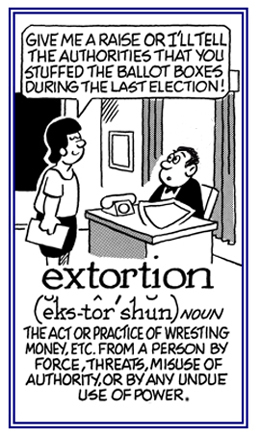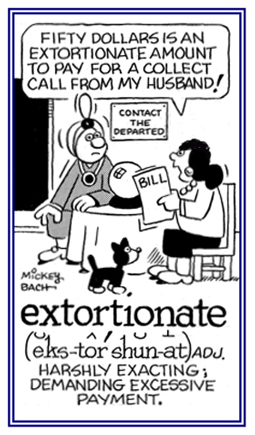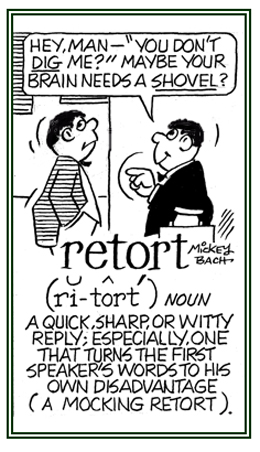tors-, tort-, -tort, tortu-, torqu-
(Latin: bend, curve, turn, twist)
1. The crime of obtaining something; such as, money or information from someone by using force, threats, or other unacceptable methods: Someone tried to use extortion by calling an elderly woman and falsely claiming that he was her nephew and that he needed money so he could travel back home and he would visit her at her apartment to pick it up the next day; however, a woman showed up and claimed she was there to get the money for the nephew.
3. Etymology: from Latin extorquere, "to wrench out, to wrest away"; from ex-, "out" + torquere "to twist".

© ALL rights are reserved.

© ALL rights are reserved.
Go to this Word A Day Revisited Index
Fortunately, the police had been informed by the elderly lady and they were waiting to arrest the woman and, later, the so-called nephew for their criminal extortion.
2. The illegal use of someone's official position, or powers, to obtain property, funds, or patronage: A secretary of a businessman threatened extortion by saying she would turn him in for embezzling money from his company unless he paid her a sum of cash.3. Etymology: from Latin extorquere, "to wrench out, to wrest away"; from ex-, "out" + torquere "to twist".


Go to this Word A Day Revisited Index
so you can see more of Mickey Bach's cartoons.
extortionate (adjective), more extortionate, most extortionate
1. Greatly exceeding bounds of reason or moderation; exorbitant; immoderate: Sally's parents didn't realize that the dessert following their dinner at the restaurant was an extortionate amount, or huge helping, of ice cream! After finishing it, Sally felt sick to her stomach!
2. Highly excessive, especially in price: The young couple was absolutely astounded by the extortionate price of the little house and garden because they would have to get a large credit from the bank to purchase it.

© ALL rights are reserved.
Go to this Word A Day Revisited Index
2. Highly excessive, especially in price: The young couple was absolutely astounded by the extortionate price of the little house and garden because they would have to get a large credit from the bank to purchase it.

Go to this Word A Day Revisited Index
so you can see more of Mickey Bach's cartoons.
extortionately (adverb), more extortionately, most extortionately
1. In a manner that greatly exceeds what is reasonable or moderate.;
2. To an exorbitant degree.
2. To an exorbitant degree.
1. A criminal who extorts money from people by threatening to expose embarrassing information about them.
2. A person who obtains something by force or threat.
2. A person who obtains something by force or threat.
Anyone who commits a criminal offense which occurs when a person either unlawfully obtains money, property, or services from someone, an entity, or an institution through illegal coercion or intimidation.
Someone who profits not by what he knows or whom he knows, but what he knows about that person.
extortive (adjective), more extortive, most extortive
1. A reference to being oppressive, violent, or unjust: "He claimed that the confession had been forced from him by the extortive police."
2. A descriptive term for someone who seizes something forcibly by violent or unlawful means from an unwilling person by physical force, a menace, duress, torture, or any undue or illegal exercise of power or ingenuity: "An extortive person is anyone who forces contributions from otherwise unwilling victims; who gets confessions of guilt by coercion; or who uses threats to obtain a promise."
2. A descriptive term for someone who seizes something forcibly by violent or unlawful means from an unwilling person by physical force, a menace, duress, torture, or any undue or illegal exercise of power or ingenuity: "An extortive person is anyone who forces contributions from otherwise unwilling victims; who gets confessions of guilt by coercion; or who uses threats to obtain a promise."
1. A winding, bending, or twisting.
2. The bending or twining of any part of a plant toward one side or the other, or in any direction from the vertical.
2. The bending or twining of any part of a plant toward one side or the other, or in any direction from the vertical.
reported, retorted, reputed, reputed
reported (ri PAWRT'd, ri POHRT'd) (verb)
1. To have made a written or verbal account of something: The radio reported that there was a bad accident on the highway.
3. To bring a matter that had been under consideration back to a group for further discussion and recommendations: The chairperson reported the proposals for energy conservation to the mayor's committee.
4. To give a formal accounting for something: The treasurer reported a balance in the city's accounts for the previous year.
The gym instructor reported on the new equipment for the gymnasium.
2. To herald the presence or arrival of something: The cabin boy climbed to the crow's nest on the ship and reported that land was in sight.3. To bring a matter that had been under consideration back to a group for further discussion and recommendations: The chairperson reported the proposals for energy conservation to the mayor's committee.
4. To give a formal accounting for something: The treasurer reported a balance in the city's accounts for the previous year.
retorted (ri TORT'd) (verb)
To have replied or answered back particularly in the context of an argument: Lenora was angry and retorted in an aggressive manner to the assertions being presented.
reputed (ri PYOOT'd) (verb)
To look upon or regard someone as having certain characteristics: Melba was reputed to have a green thumb and could make any garden bloom in the spring.
reputed (ri PYOOT'd) (adjective)
Relating to someone or something that is supposed to be true, to exist, or to have a specified identity, etc.: Jerry's friend was hired for his reputed talents as a superior manager.
"James has reported his findings," Nettie retorted sharply to criticism from her boss. As an accountant, she was reputed to be very thorough and exacting in her analysis of the budget.
A quick and often angry reply: Norbert made a clever retort when the customer made obviously false claims about the quality of the products in the market.

© ALL rights are reserved.
Go to this Word A Day Revisited Index
A retort is a battle of words in which the best defense is a good offense, and the more offensive the better.

Go to this Word A Day Revisited Index
so you can see more of Mickey Bach's cartoons.
retort (verb), retorts; retorted; retorting
1. To reply immediately in an angry or humorous way to something that someone has said: "Shirley retorted angrily that it was not true that she had not completed her assignment and she showed proof that it had been done."
2. To present a counterargument to something that has been presented: "The speaker was retorting to a critic in the audience when he responded by saying, 'It's obvious that you don't know what you are talking about.' "
2. To present a counterargument to something that has been presented: "The speaker was retorting to a critic in the audience when he responded by saying, 'It's obvious that you don't know what you are talking about.' "
1. A twisting or turning toward the left.
2. Rotary eye movements to the left, with reference to the 12 o'clock position.
2. Rotary eye movements to the left, with reference to the 12 o'clock position.
1. A pastry shell with shallow sides, no top crust, and any of various fillings.
2. Chiefly British: a prostitute or a woman considered to be sexually promiscuous.
3. Etymology: "small pie" from about 1400; from Old French tarte, "flat, open-topped pastry"; possibly an alteration of torte, from Late Latin torta, "round loaf of bread" (in Medieval Latin, as written and spoken about 700 to about 1500; "a cake, a tart").
2. Chiefly British: a prostitute or a woman considered to be sexually promiscuous.
3. Etymology: "small pie" from about 1400; from Old French tarte, "flat, open-topped pastry"; possibly an alteration of torte, from Late Latin torta, "round loaf of bread" (in Medieval Latin, as written and spoken about 700 to about 1500; "a cake, a tart").


